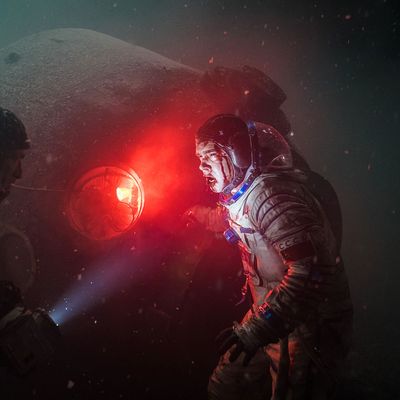
The new Russian horror film Sputnik whipsaws between suggested horror and schlock so furiously that it turns inconsistency into a virtue. It’s a creepy chamber drama that morphs regularly into an effects-laden ick-fest. But transformation is in the film’s DNA. It starts in space, in 1983, where two Soviet cosmonauts are dreaming about what they’ll do when they get home, when they catch sight of something outside their spaceship’s window. The next thing we know, a Kazakh horseman finds the wreckage of their vehicle smoldering in an empty field. One cosmonaut has a hole in his head; the other, Konstantin (Pyotr Fyodorov), is alive — but he’s got something else in him, as we’ll soon find out.
Our heroine is disgraced psychologist Tatyana Klimova (Oksana Akinshina), who is secretly enlisted by a hard-ass colonel (Fyodor Bondarchuk) to travel to the military base where the survivor is being kept and interrogate him. Konstantin remembers nothing about what happened on his ship. He also has no idea, we soon learn, that he has become the human host for a giant, gooey, slithery alien that expels itself out of his mouth every night, and then crawls back in. What’s more, the extraterrestrial and the man have started to mind-meld. This is why the military wants Tatyana there; they’re hoping she can find a way to separate the man from the alien, so that the creature can be used for … well, the kinds of things that military people always seem to want to do with mysterious intergalactic life forces.
The general set-up of Sputnik isn’t anything particularly new. It has echoes of Alien, and Starman, and any number of other sci-fi films. But the tone is unusual, because director Egor Abramenko never quite fully reveals what kind of movie he’s making here; there’s an uncertainty to the atmosphere of dread because we’re never sure what we’re supposed to be scared of. Is it the alien? Is it Konstantin? Is it the military men? Is it the dour, secretive Tatyana? That uncertainty feels intentional (and entirely in keeping with the grim, paranoid mood of the Soviet years).
Abramenko also tweaks the usual character dynamics in interesting ways. Much of Sputnik is built around Konstantin and Tatyana’s conversations, and their interaction is the best thing about the picture. Each is hiding something. She has a naturally confrontational attitude towards the world, and Akinshina works wonders with the character’s chilliness — it’s clear Tatyana has buried layers of pain. Konstantin, on the other hand, is hiding something because he remembers so little; in trying to delve into his mind, Tatyana discovers other things from his past. The psychological cat-and-mouse game between them makes the film. It also pays off beautifully in the surprisingly moving final scene, which one might even call a minor “twist.”
So that’s the suggested horror part. But like I said, the film transforms. Whenever the alien appears, the talk dies away and we get something more immediate and visceral. The VFX isn’t exactly seamless — the creature does look a little too computer-generated — but even that, perhaps inadvertently, enhances the material. There’s a simplicity to the creature’s design that adds to the creepiness; it feels less like a specific monster and more like an existential fact. Sputnik’s genre pleasures are modest, but like the best sci-fi, it gets you thinking.
More Movie Reviews
- Death of a Unicorn Is 5 Pounds of Purple Poop In a 10-Pound Bag
- The Thriller Drop Is a Perfect Addition to the Bad-First-Date Canon
- The Accountant 2 Can Not Be Taken Seriously


